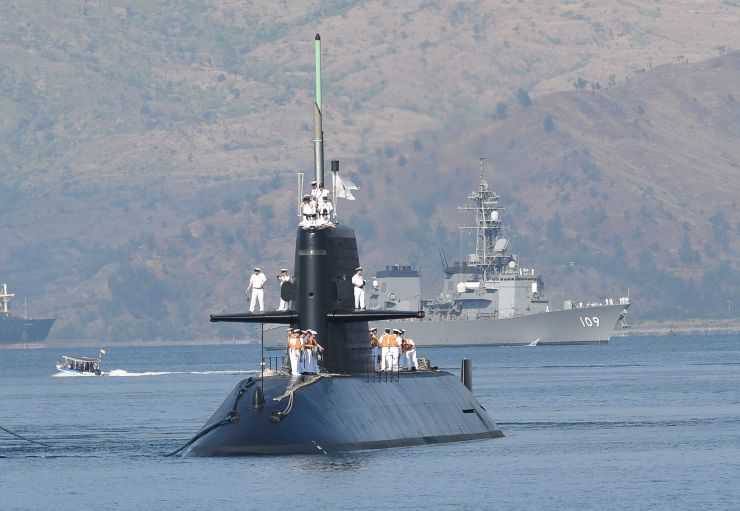A bankruptcy in the Philippines sparks concerns of Chinese firms taking over a former US naval base
26 January, 2019

In the Philippines, a major corporate bankruptcy has sparked national security concerns about whether a port near the disputed South China Sea could fall under Beijing's control.
Philippine officials are currently exploring ways to take over a shipyard located at a former U.S. naval base known as Subic Bay to prevent Chinese companies from buying the site.
Officials, including the defense secretary, have expressed concerns of a Chinese presence in the area, even if it's a commercial one. Those worries come against the backdrop of China's growing aggression in the South China Sea and Beijing previously seizing neighboring islands in the area that are claimed by Manila.
Hanjin Heavy Industries and Construction Philippines has been operating an industrial shipyard in Subic Bay for years. But the company, a shipbuilding unit of South Korean firm Hanjin Heavy Industries and Construction, declared bankruptcy in January after defaulting on loans of over $400 million from Philippine banks. It is believed to be one of the largest corporate defaults in Philippine history and puts thousands of local jobs at risk.
Hanjin Philippines has asked the Manila government to help find investors willing to take over its shipyard operations and help its staff, according to the official Philippine News Agency. The company also has outstanding loans of $900 million from South Korean banks.
Fears of a Chinese takeover
Subic Bay, which lies around 100 kilometers northwest of Manila Bay, is an area around the size of Singapore. It was previously operated by the navies of Spain and the United States, and was one of the world's largest U.S. naval facilities. After closing in the early 1990s, it was transformed into a special economic zone by the Philippine government.
Two Chinese firms have expressed interest in taking the shipyard off Hanjin Philippines' hands, prompting swift action from Manila officials who indicated they were unsettled by that idea as Beijing continues to flex its muscles in the South China Sea.
Senator Grace Poe has called for an inquiry to determine whether there needs to be legal and regulatory frameworks for foreign ownership of such a strategic national asset, local media reported.
Last week, Defense Secretary Delfin Lorenzana said he had met with President Rodrigo Duterte to discuss the prospect of the Philippine Navy acquiring the shipbuilding business.
"The Philippine Navy suggested that, why not the Philippines take over so that we'll have a naval base there? Then we'll have shipbuilding capabilities," international media quoted Lorenzana as saying during an event at the Foreign Correspondents Association of the Philippines last week.
That's an entirely realistic scenario, analysts said.
"It would be consistent with political initiatives to increase domestic industrial development," said Zoe Stanley Lockman, associate research fellow specializing in defense and security at Singapore's Nanyang Technological University. She said there's currently a bill on the country's Senate floor that, if passed, would increase support for the defense industry, large parts of which are already government owned and operated.
"We shouldn't overstate the importance of a Chinese company operating Hanjin," said Zack Cooper, a research fellow specializing in U.S. defense strategy in Asia at the American Enterprise Institute. "Just because a Chinese company operates the port and shipyard does not mean that Chinese military vessels can dock there — the same is true with Darwin Port in Australia, which is now operated by a Chinese firm."
Unclear what Duterte wants
The Philippine Navy taking over the shipyard may not bode well for Duterte, who has advocated a pro-Beijing stance even as the Asian superpower ignores Manila's contesting territorial claims in the South China Sea.
"It is unclear what the government wants to do" in the case of Subic Bay, said Anwita Basu, Southeast Asia analyst at the Economist Intelligence Unit.
The armed forces seem more concerned than the president about a potential Chinese presence and national security breaches, she told CNBC: "Indeed, were Chinese companies to take over the commercial lease of the shipyard, it would play well into the president's desire to attract investments from China."
After losing a 2016 court case that invalidated its South China Sea claims against Manila, Beijing continues to administer islands and Duterte hasn't publicly pressed Chinese President Xi Jinping on the matter. Critics say Duterte is making geopolitical concessions in the international waterway in exchange for promises of Chinese capital that have yet to materialize.
"It is unlikely that the navy will be able to effectively run the shipyard," Basu said. The state owns the site so a naval takeover won't be hard, she added, but Manila will still have to rely on foreign investment as it struggles "to raise interest from domestic investors, partly because of the sunk costs involved and preferential treatment given to foreign investors."
Companies from the U.S., Australia, Japan and South Korea have also expressed interest, according to Lorenzana, who suggested that Manila could also lease a majority stake to an external entity while keeping a minority share.
TAG(s):
